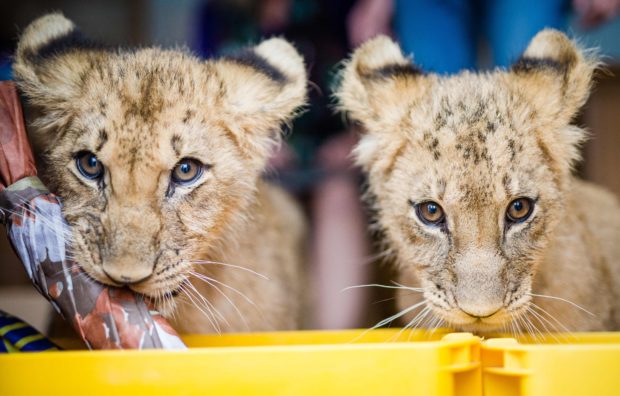
ENDANGERED Lion cubs Sarah and Benjamin are shown at a circus in Stuttgart, Germany. The endangered animals are among 34 selected to receive heightened protection at the meeting of the Conservation of Migratory Species in Manila. —AFP
Lions, chimpanzees, giraffes, leopards and a wide variety of sharks, including the whale shark, received added protection at a UN wildlife conference in the Philippines, organizers said on Saturday.
Some 34 endangered species were selected to receive heightened conservation efforts at the 12th conference of state parties to the UN Convention on the Conservation of Migratory Species (CMS) that just concluded in Manila.
Protecting migratory species poses particular difficulties since they cross borders, including possibly moving to countries with less stringent wildlife protection systems, said Bradnee Chambers, CMS executive secretary.
“If the species is moving around all of these countries, everybody has to pitch in,” he said at the end of the weeklong conference.
Director Theresa Mundita Lim of the Biodiversity Management Bureau said migratory animals played a critical role in the planet’s ecosystem.
‘Inspiration for people’
“They act as pollinators, control pests and are a source of food and income. They are also an inspiration for people here in the Philippines and all around the world,” Lim said.
Lions, leopards and chimpanzees were singled out as needing more conservation work. The chimpanzee in particular is at risk as its numbers have dropped sharply in recent years due to habitat loss, the organizers said.
The giraffe, which is in decline throughout Africa with fewer than 90,000 animals left in the wild, was also listed.
All four of these African mammals were approved by a “wide majority” for additional protection measures, a CMS statement noted.
“Everybody in this room can identify with these animals,” Chambers remarked.
Vultures, sharks
Less popular species also received additional protection, including 10 species of vultures.
Chambers said these birds provided a vital service by cleaning out carcasses, which prevents the spread of diseases like anthrax and rabies.
Also listed was the whale shark, the largest fish in the world. The Philippines had lobbied for this creature, which had become a major tourist attraction.
Three other shark species—the angel shark, dusky shark and blue shark—were also listed along with three species of rays, the organizers said.
The Pew Charitable Trusts praised the CMS action, saying it was crucial to save these marine animals.
“In some regions, the newly protected shark species have experienced population declines of 50 percent or more,” Pew shark conservation expert KerriLynn Miller said in a statement.
Also listed was the Gobi bear, which lives in the wild regions shared by Mongolia and China. Only 45 specimens remain in the wild, the organizers said.
Compliance review
One of the breakthroughs of the meeting was the adoption of a “compliance review mechanism,” to check if member countries respect the protective lists, the organizers said.
The conference also saw agreements to create an intergovernment task force to curb the illegal killings of birds crossing the East Asian-Australasian Flyway; a conservation road map for the critically endangered African wild ass; and guidelines on assessing impact of marine noise activities
Also adopted by the convention’s 124 state-parties during the weeklong conference was the Manila Declaration on Sustainable Development and Migratory Species, and the Philippine proposals for resolutions on Marine Protected Area Networks in Southeast Asia, sustainable tourism, and the conservation of critical intertidal and coastal habitats for migratory species.
A Pew international conservation expert, Max Bello, said that even though the CMS lists did not provide for sanctions, many member countries still complied with them.
“It does work. It needs more [authority] for sure. But you can use it. It’s actually a very good tool,” Bello said.
“A year or two ago, I was helping some group in Peru in the coast of the South Pacific and we used CMS to convince the government of Peru to protect the giant mantas that come from Ecuador every year,” he recalled.
More than 120 states are party to the CMS, but this does not include China and many other Asian countries.—REPORTS FROM AFP AND JAYMEE T. GAMIL